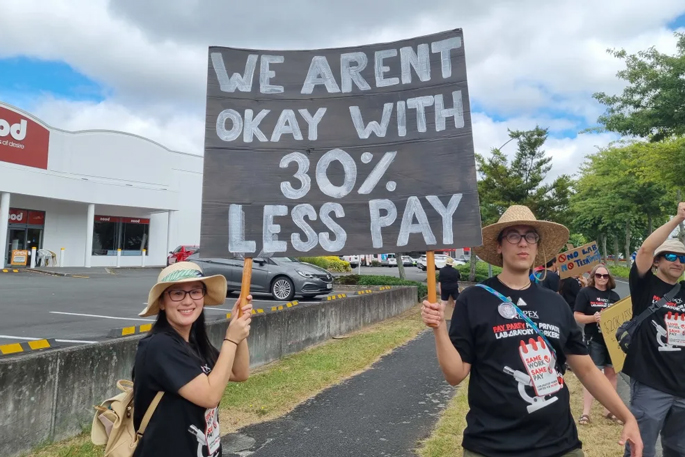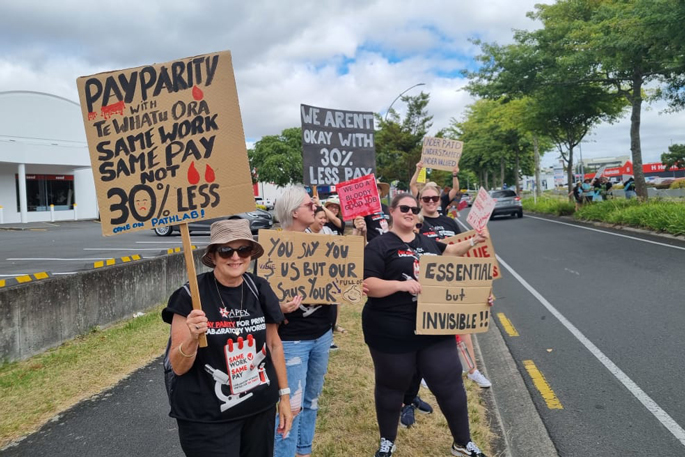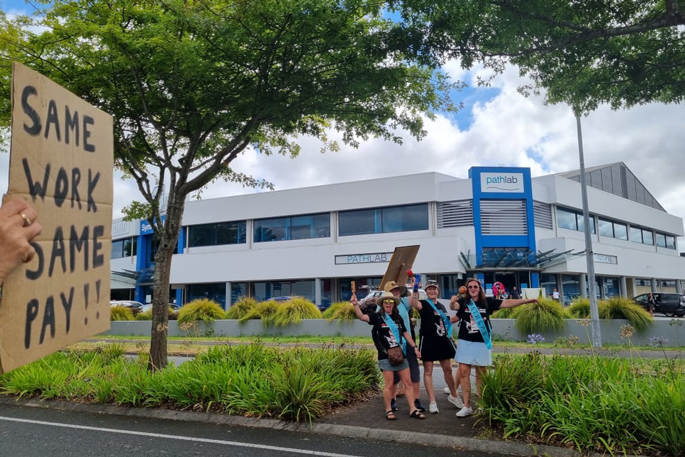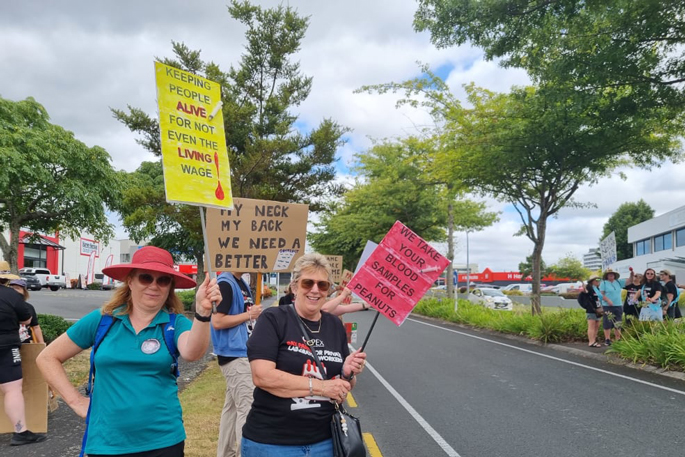Major surgical cases have been delayed in some places because of a strike by lab workers at public hospitals in Wellington, Palmerston North, Tauranga, Rotorua, Whakatāne, Nelson and Dunedin.
In Waikato all community laboratory collection points are closed bar one in central Hamilton, which was processing priority cases only, as 900 workers walk off the job for 24 hours on Wednesday, February 5, and Friday, February 7.
Pickets in Hamilton, Wellington, Christchurch and Whakatāne by Apex Union workers were gathering support for their claim that hospital lab workers are paid between 28 and 32 percent more than their counterparts at private providers.
Apex advocate Sammy Heimsath said there had been no change in the bargaining positions of the three employers, private providers Pathlab, Awanui Labs and Medlab Central.
"The impacts on hospital and community health services in many locations is looking to be significant," Heimsath said.
"About 70 percent of all clinical hospital decision-making is reliant on a laboratory test to confirm diagnosis, and in the case of cancer treatment, 100 percent.
"We have already seen a significant reduction in hospital laboratory services in many regions, and in the case of some community collection centres, we have seen a halting of services all together."
There was, however, a contingency plan in place to ensure life-preserving services were maintained for the period of strike action, he said.
 The strike will cover 48 hours, over 5 and 7 February. Photo: RNZ/ Libby Kirkby-McLeod
The strike will cover 48 hours, over 5 and 7 February. Photo: RNZ/ Libby Kirkby-McLeod
The three private labs were largely funded by Health NZ to provide vital hospital and community services to the country's public health system, according to New Zealand Pathology chairperson Dr Peter Gootjes.
Community pathology services - those delivered outside the hospital setting - provided access to collection services, diagnostic testing and disease analysis directly to patients in the community.
The labs also provided a third of hospital pathology services.
Gootjes said the industrial action, which was taking place either side of Waitangi Day, followed by the weekend, meant healthcare services across the country were likely to be significantly impacted for the next few days.
He apologised for any inconvenience and said the employers, Pathlab, Awanui Labs and Medlab Central, were working to minimise the impact on patients.
"Our laboratories play an essential role in the provision of healthcare services, and we are working closely with the union, hospitals and health professionals to ensure essential life-preserving services remain available and ongoing disruption to the community can be minimised.
 Lab workers on strike in Hamilton. Photo: RNZ/ Libby Kirkby-McLeod
Lab workers on strike in Hamilton. Photo: RNZ/ Libby Kirkby-McLeod
Health New Zealand Te Whatu Ora living well director Martin Hefford said extensive planning had been undertaken by both the private labs and Health NZ to ensure continuity of care and to manage patient safety.
"The major impact of the private laboratory strike across New Zealand will be felt in our communities, but effects are not expected to be acute. The private laboratories have been working with community service providers and hospitals on planning for this."
He said most hospitals in New Zealand were running at close to, or business as usual, during the action.
This was especially the case in major tertiary centres such as Auckland, Waikato, Wellington and Christchurch, he said.
"However, there is significant impact for hospitals in Whakatāne, Rotorua, Taupō, Nelson, Dunedin, Invercargill and Queenstown.
"At those hospitals, some major surgery has been deferred. In most situations, this has been replaced with minor surgical procedures which are not laboratory dependent."
He said the private laboratories have negotiated access to union members for life-preserving services to enable non-deferrable laboratory tests to continue at these sites.
 Photo: RNZ/ Libby Kirkby-McLeod
Photo: RNZ/ Libby Kirkby-McLeod
Hefford said Health NZ was not the employer of this workforce, and was not involved in the bargaining.
"The private laboratories are responsible for negotiating and agreeing wage rates with the unions representing laboratory workers, including APEX."
He said Health NZ respected the rights of workers to take strike action.
Hefford said the 2023 settlement of the pay equity legal claim agreed between Health NZ and the unions increased rates for APEX members working for Health NZ.



3 comments
I'm not sure...
Posted on 05-02-2025 19:06 | By groutby
which way to go on this one...indeed Health NZ seem to be 'in the gun' as an easily targeted reason for the issue, but these privately owned companies have I guess a negotiated contract with Health NZ....which would include any salary movement up to the end of the contract?
So maybe (maybe) the issue lies with the companies involved or the Union not being as effective as they should be?....of course we rely on these companies to supply service, but if Health NZ negotiated a different 'equity' rate for their own labs, then it is up to the privately run organisations to step up and make appropriate adjustment and re negotiate better next time....IF Health NZ hasn't started their own labs.....
WOW
Posted on 05-02-2025 20:08 | By Yadick
An effective strike and not a single road was blocked, not a single motorist poised off, and not a single business suffering a loss.
I hope and Pray you get what you rightfully deserve. Thank you for protesting in a caring and thoughtful way and not self-centered and self-entitled. You are appreciated.
Oh
Posted on 05-02-2025 20:09 | By Yadick
Oh, and no weapons involved.
Leave a Comment
You must be logged in to make a comment.